113 books about Selected Poems and 7
start with C
113 books about Selected Poems and 7
113 books about Selected Poems
7 start with C start with C
7 start with C start with C

A Calligraphy of Days
Selected Poems
Krzysztof Siwczyk
Seagull Books, 2024
Verses that oscillate between the turmoil of post-communist Eastern Europe to understated reflections on grief and mortality.
The sixty-four poems in A Calligraphy of Days reflect Krzysztof Siwczyk’s wide-ranging and variegated style. Born in 1977, Siwczyk has lived most of his life in the Silesian city of Gliwice. In 1995, he became a wunderkind of the Polish poetry scene with his debut volume Wild Kids, an edgy and unsentimental narrative of youthful tribulations and urban malaise during Poland’s transition from communism to capitalism. Siwczyk’s poems careen down the page at great speed, relying on clever turns of phrase or an idea that illuminates a larger meaning. As in calligraphy, a meandering subterranean process connects meaning and memory, thought and verse. Teased to the surface, words and images emerge in rapid, terse, and precise bursts.
Throughout his career, Siwczyk has never ceased to challenge our sense of who we are—changing course multiple times in the process. Following several volumes full of expansive lines, his most recent works offer spare meditations on illness and grief. Clipped and understated, these post-Holocaust poems address our inability to speak of death and tragedy.
The sixty-four poems in A Calligraphy of Days reflect Krzysztof Siwczyk’s wide-ranging and variegated style. Born in 1977, Siwczyk has lived most of his life in the Silesian city of Gliwice. In 1995, he became a wunderkind of the Polish poetry scene with his debut volume Wild Kids, an edgy and unsentimental narrative of youthful tribulations and urban malaise during Poland’s transition from communism to capitalism. Siwczyk’s poems careen down the page at great speed, relying on clever turns of phrase or an idea that illuminates a larger meaning. As in calligraphy, a meandering subterranean process connects meaning and memory, thought and verse. Teased to the surface, words and images emerge in rapid, terse, and precise bursts.
Throughout his career, Siwczyk has never ceased to challenge our sense of who we are—changing course multiple times in the process. Following several volumes full of expansive lines, his most recent works offer spare meditations on illness and grief. Clipped and understated, these post-Holocaust poems address our inability to speak of death and tragedy.
[more]
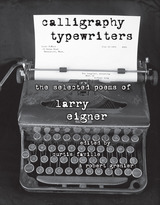
Calligraphy Typewriters
The Selected Poems of Larry Eigner
Larry Eigner, Edited and introduced by Curtis Faville and Robert Grenier, Foreword by Charles Bernstein
University of Alabama Press, 2016
The first and only single-volume collection of Larry Eigner’s most significant poems, gathering in one place the most celebrated of the several thousand poems that constitute his remarkable life’s work
Larry Eigner began writing poetry at age eight and was first published at age nine. Revered by poets and artists across a broad spectrum of generations and schools, Eigner’s remarkably moving poetry was created through enormous effort: because of severe physical disabilities, he produced his texts by typing with only one index finger and thumb on a 1940 Royal manual typewriter, creating a body of work that is unparalleled in its originality.
Calligraphy Typewriters showcases the most celebrated of Eigner's several thousand poems, which are an important part of the Black Mountain/Projectivist movement that began in the 1950s and which remain a primary inspiration for many younger writers, including those in the Language movement that began in the 1970s. In its two sections—Swampscott and Berkeley, named for the two locales where Eigner lived and worked—the volume traces his fantastic perception of the ordinary and his zeal for language. Eigner’s use of visual space, metaphor, and description provide fascinating insights into both his own life and the world that surrounded him. This volume maintains the distinctive visual spacing of his original typescripts, reminders of his method, aesthetic sensibility, and creative ability to compose on the typewriter.
A collection that reimagines the ordinary, Calligraphy Typewriters is the definitive selection of Eigner’s poems, and will serve well not only poets and students of poetry, but readers and writers of every vein.
Larry Eigner began writing poetry at age eight and was first published at age nine. Revered by poets and artists across a broad spectrum of generations and schools, Eigner’s remarkably moving poetry was created through enormous effort: because of severe physical disabilities, he produced his texts by typing with only one index finger and thumb on a 1940 Royal manual typewriter, creating a body of work that is unparalleled in its originality.
Calligraphy Typewriters showcases the most celebrated of Eigner's several thousand poems, which are an important part of the Black Mountain/Projectivist movement that began in the 1950s and which remain a primary inspiration for many younger writers, including those in the Language movement that began in the 1970s. In its two sections—Swampscott and Berkeley, named for the two locales where Eigner lived and worked—the volume traces his fantastic perception of the ordinary and his zeal for language. Eigner’s use of visual space, metaphor, and description provide fascinating insights into both his own life and the world that surrounded him. This volume maintains the distinctive visual spacing of his original typescripts, reminders of his method, aesthetic sensibility, and creative ability to compose on the typewriter.
A collection that reimagines the ordinary, Calligraphy Typewriters is the definitive selection of Eigner’s poems, and will serve well not only poets and students of poetry, but readers and writers of every vein.
[more]
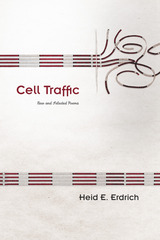
Cell Traffic
New and Selected Poems
Heid E. Erdrich
University of Arizona Press, 2012
Cell Traffic presents new poems and uncollected prose poetry along with selected work from award-winning poet Heid Erdrich's three previous poetry collections. Erdrich's new work reflects her continuing concerns with the tensions between science and tradition, between spirit and body. She finds surprising common ground while exploring indigenous experience in multifaceted ways: personal, familial, biological, and cultural. The title, Cell Traffic, suggests motion and Erdrich considers multiple movements-cellular transfer, the traffic of DNA through body parts and bones, "migration" through procreation, and the larger "movements" of indigenousness and ancestral inheritance.
Erdrich's wry sensibility, sly wit, and keenly insightful mind have earned her a loyal following. Her point of view is always slightly off center, and this lends a particular freshness to her poetry. The debunking and debating of the science of origins is one of Erdrich's focal subjects. In this collection, she turns her observational eye to the search for a genetic mother of humanity, forensic anthropology's quest for the oldest known bones, and online offers of genetic testing. But her interests are not limited to science. She freely admits popular culture into her purview as well, referencing sci-fi television series and Internet pop-up ads.
[more]
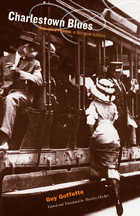
Charlestown Blues
Selected Poems, a Bilingual Edition
Guy Goffette
University of Chicago Press, 2007
Letter to the unknown woman across the street, I
Curtains, blinds, draperies, shades, no, nothing
Madame, to conceal from your Cyclops’ eye
in the shadows from which it spies on me
this long pale body, false corpse tired out
with debauchery, which is swooning too
before your balcony, with your drying
stockings and scanties of a nun at bay—
poisonous flowers for a lonely man
whom death panics, draws erect, demarrows
in the night, riveted to your white thighs.
Readers who denounce most contemporary French poetry as self-referential experimentation, word games, exercises in deconstruction, or other kinds of incomprehensible writing disconnected from everyday life—brace yourselves for a revelation. Erotic and urbane, distinguished by formal skill yet marked by the subtlest shades of feeling, Guy Goffette’s unabashedly lyrical poems pay homage to both Verlaine and Rimbaud, whom he counts as his important forbears, with echoes of Auden and Pound, Pavese and Borges.
In Charlestown Blues, poet and translator Marilyn Hacker has chosen a tightly thematic selection of poems, all centering around the notion of “blue”—the color and the emotion, as well as that quintessentially American style of musical performance. Hacker’s crystalline and musical English renderings will show Anglophones why Goffette is considered one of the most important poets writing in French today.
Curtains, blinds, draperies, shades, no, nothing
Madame, to conceal from your Cyclops’ eye
in the shadows from which it spies on me
this long pale body, false corpse tired out
with debauchery, which is swooning too
before your balcony, with your drying
stockings and scanties of a nun at bay—
poisonous flowers for a lonely man
whom death panics, draws erect, demarrows
in the night, riveted to your white thighs.
Readers who denounce most contemporary French poetry as self-referential experimentation, word games, exercises in deconstruction, or other kinds of incomprehensible writing disconnected from everyday life—brace yourselves for a revelation. Erotic and urbane, distinguished by formal skill yet marked by the subtlest shades of feeling, Guy Goffette’s unabashedly lyrical poems pay homage to both Verlaine and Rimbaud, whom he counts as his important forbears, with echoes of Auden and Pound, Pavese and Borges.
In Charlestown Blues, poet and translator Marilyn Hacker has chosen a tightly thematic selection of poems, all centering around the notion of “blue”—the color and the emotion, as well as that quintessentially American style of musical performance. Hacker’s crystalline and musical English renderings will show Anglophones why Goffette is considered one of the most important poets writing in French today.
[more]

Clean Slate
New & Selected Poems
Daisy Zamora
Northwestern University Press, 1993
To be a woman in revolutionary Nicaragua meant to take an active role in reshaping a country. Daisy Zamora came out of that experience as a poet who found her own voice in the context of extraordinary popular struggle. Her Clean Slate: New & Selected Poems is a collection that embodies a spirit of personal and political liberation. These 110 poems include works written between the years 1968 and 1993.
[more]
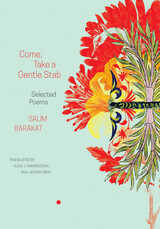
Come, Take a Gentle Stab
Selected Poems
Salim Barakat
Seagull Books, 2021
Introduces renowned Kurdish-Syrian writer Salim Barkat to an English audience for the first time, with translated selections from his most acclaimed works of poetry.
Although Salim Barakat is one of the most renowned and respected contemporary writers in Arabic letters, he remains virtually unknown in the English-speaking world. This first collection of his poetry in English, representing every stage of his career, remedies that startling omission. Come, Take a Gentle Stab features selections from his most acclaimed works of poetry, including excerpts from his book-length poems, rendered into an English that captures the exultation of language for which he is famous.
A Kurdish-Syrian man, Barakat chose to write in Arabic, the language of cultural and political hegemony that has marginalized his people. Like Paul Celan, he mastered the language of the oppressor to such an extent that the course of the language itself has been compelled to bend to his will. Barakat pushes Arabic to a point just beyond its linguistic limits, stretching those limits. He resists coherence, but never destroys it, pulling back before the final blow. What results is a figurative abstraction of struggle, as alive as the struggle itself. And always beneath the surface of this roiling water one can glimpse the deep currents of ancient Kurdish culture.
Although Salim Barakat is one of the most renowned and respected contemporary writers in Arabic letters, he remains virtually unknown in the English-speaking world. This first collection of his poetry in English, representing every stage of his career, remedies that startling omission. Come, Take a Gentle Stab features selections from his most acclaimed works of poetry, including excerpts from his book-length poems, rendered into an English that captures the exultation of language for which he is famous.
A Kurdish-Syrian man, Barakat chose to write in Arabic, the language of cultural and political hegemony that has marginalized his people. Like Paul Celan, he mastered the language of the oppressor to such an extent that the course of the language itself has been compelled to bend to his will. Barakat pushes Arabic to a point just beyond its linguistic limits, stretching those limits. He resists coherence, but never destroys it, pulling back before the final blow. What results is a figurative abstraction of struggle, as alive as the struggle itself. And always beneath the surface of this roiling water one can glimpse the deep currents of ancient Kurdish culture.
[more]
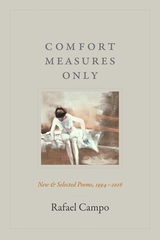
Comfort Measures Only
New and Selected Poems, 1994–2016
Rafael Campo
Duke University Press, 2018
In Comfort Measures Only, Rafael Campo bears witness to the unspeakable beauty bound up with human suffering. Gathered from his over twenty-year career as a poet-physician, these eighty-nine poems—thirty-one of which have never been previously published in a collection—pull back the curtain in the ER, laying bare our pain and joining us all in spellbinding moments of pathos. The poet, who is also truly a healer, revives language itself—its sounds channeled through our hearts and lungs, its rhythms amplified through the stethoscope—to make meaning of our bewilderment when our bodies so eloquently and yet wordlessly fail us. Campo’s transcendent poems, in all their modernity amidst the bleep of heart monitors and the wail of ambulance sirens, remind us of what the ancients understood: that poetry sustains us, and whether we live or die, through what we can imagine and create in our shared voices we may yet achieve immortality.
[more]
READERS
Browse our collection.
PUBLISHERS
See BiblioVault's publisher services.
STUDENT SERVICES
Files for college accessibility offices.
UChicago Accessibility Resources
home | accessibility | search | about | contact us
BiblioVault ® 2001 - 2024
The University of Chicago Press









